Make In India: Rural Infrastructure and Sustainable Agriculture Initiatives
Total Views |
Rural Infrastructure and Sustainable Agriculture Initiatives
April 1, 2016, IIC, New Delhi
1st Session
Governance Reforms for
Make in India Initiative
Chair: Shri ArunMaira, Former Member, Planning Commission
Key Speakers:
Shri Anand P Gupta, Director, Economic Management Institute, New Delhi
Shri Dhirendra Singh, Chairman, Committee on Facilitating ‘Make in India’ in the Defence Sector
Shri Madhav Lal, Secretary Micro, Small & Medium Enterprises (MSME)
Shri Mahesh Gupta, MD Kent RO & President PHD Chamber
Shri. Mukesh Gulati, Executive Director, Foundation for MSME Clusters
Dr. N. C. Saxena, Former Member, Planning Commission
Shri Ved Jain, Vice President, ASSOCHAM, New Delhi
2nd Session
Rural Infrastructure and Sustainable Agriculture Initiatives
Chair: Shri Gopal Agarwal, India Policy Foundation
Key Speakers:
Shri Ajay VirJakhar, Chairman, Bharat KrishakSamaj (Farmers Forum, India)
Shri Badri Narayan Choudhary, General Secretary,
BhartiyaKisanSangh
Shri Harsh Singh, Ex Assistant Resident Representative, UNDP, India
Shri PradipBaijal,
Former Chairman, Telecom Regulatory Authority of India
Shri B Surendran,
All India Organisation Secretary, BhartiyaMazdoorSangh
Shri Sanjeev Chopra,
April 1, 2016
Venue
India International Centre, New Delhi
Welcome Address
Shri Gopal Agarwal, Treasurer,
India Policy Foundation
Shri Pradeep S Mehta,
secretary General, CUTS International
Inaugural Address
Shri Amitabh Kant, CEO NITI Aayog
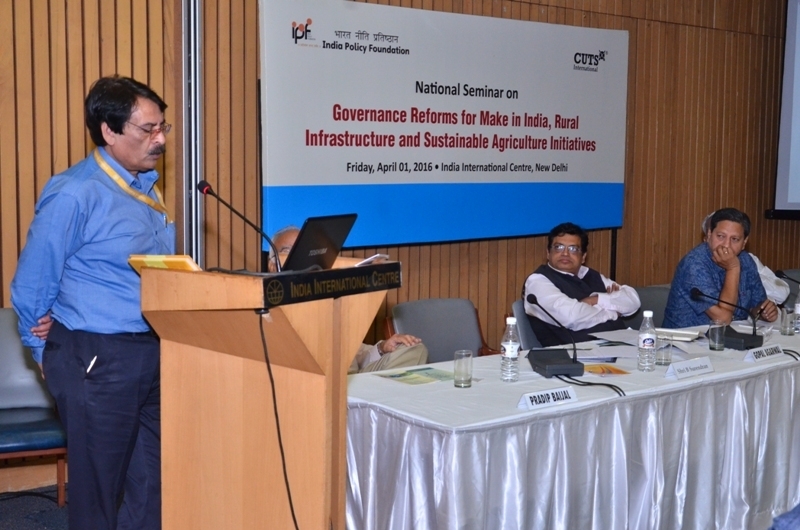
Make in Indiais a philosophy which lays emphasis on action, innovation, and creativity. They act as fundamental catalysts in the Vision of our country’s inclusive growth. It stands for creating value trust through our action that maintains high moral and ethical standards grounded in honesty, integrity, reliability, forthrightness and professionalism in all transactions and relationships in a challenging and rewarding environment.
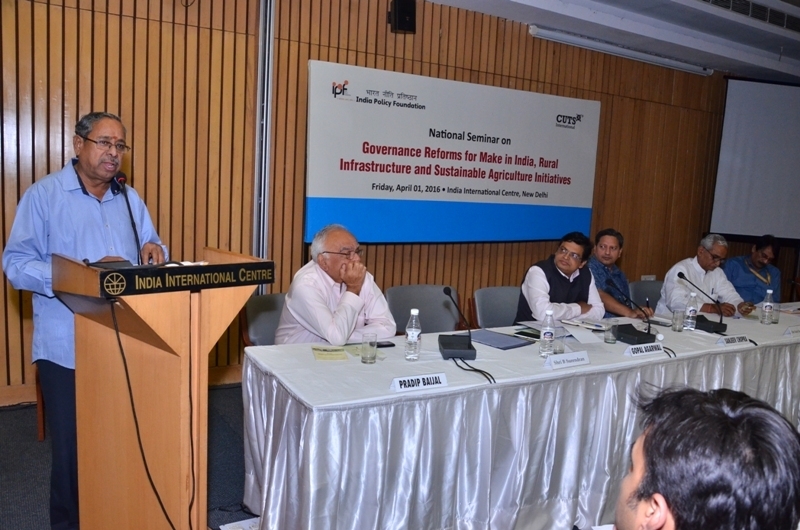
Make in India, launched by Prime MinisterNarendraModi is a dynamic, invigorating call to action to India’s citizens and business leaders, and an invitation to potential partners and investors around the world. It represents a comprehensive and unprecedented overhaul of outdated processes and policies. Most importantly, it represents a complete transformation of the Government’s mindset – a shift from issuing authority to a business partner, in keeping with Prime Minister Modi’s tenet of ‘Minimum Government, Maximum Governance’.
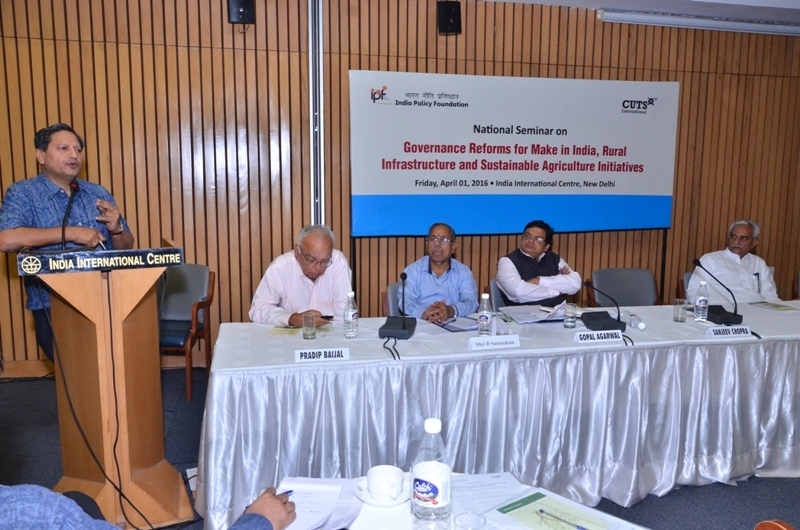
In light of this vision and a galvanized call by our Prime Minister, ipf and CUTS organized a seminar on MAKE IN INDIA. The current seminar deliberated upon the issues of implementation and professionalism in India’s inclusive growth and sustainable development.
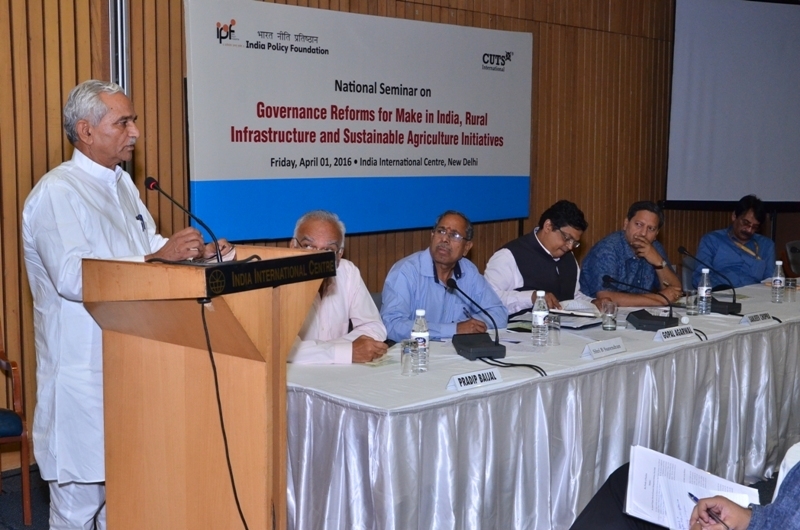
Inaugural Session
Inauguratingthe session, Shri Pradeep Mehta, Secretary General, Consumer Unity & Trust SocietyInternational(CUTS) welcomed all on behalf of CUTS and India Policy Foundation (ipf).He said the focus of today’s good governance is on the issues of implementation. The governance systems in India require ahuge amount of transformation and within the kind of the boundaries and limitations that exist, even if there are small efforts which succeed then a bunch of large efforts may be benefitted. He further said good governance is a sine qua non for sustainable growth. Some of the basic principles or attributes of good governance would include accountability, transparency, equity, performance (effectiveness and efficiency), participation/voice, therule of law, strategic vision, lack of arbitrariness, ethics and integrity and most importantly predictability. In India, we need these attributes more than ever to ensure speedy as well as inclusive growth. The NDA government has launched numerous forward-looking initiatives such as Make in India, Skill India, Digital India, Startup India and a renewed focus on rural India and agriculture, amongst others. A good public procurement law is the need of the hour. He stressed on aconstant evaluation that has to be preceded by a measurement system.
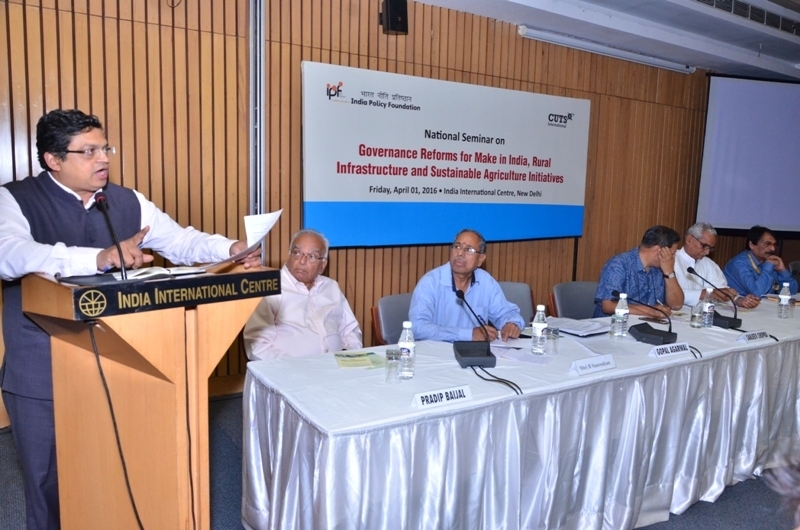
Shri Gopal Agarwal, Trustee, India Policy Foundationexpressed concern that unless fault lines or problems can be tackled, we can move ahead and NITI Aayog’s role will be very important in this.
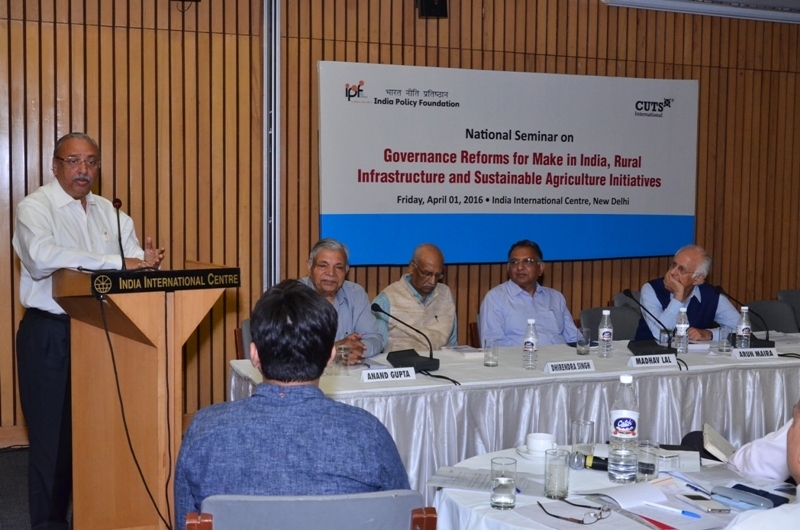
Sharing his experiences with various stakeholders while his stint in the 12th Planning Commission, ArunMaira, Former Member, Planning Commissionsaid all on the panel accorded that don’t make another plan, just implement the plans that have already been made.Shri Amitabh Kant, Chief Executive Officer, NITI Aayogthrew light on the fact that India needs to grow for three decades or more to be able to lift a vast segment of our population above the poverty line. If we want to grow at 9-10 per cent per annum over a long period of time which is what India’s ambition should be, India needs to do several things. He said that we need to dismantle rules, regulations, and procedures and we need to make India a very simple, a very easy place to do business. India must become cost-competitive and have an important enough export-led strategy. Mr. Kant expressed that India has become a nation of a billion mobile, it is the only nation with a billion biometrics.He stated that India is the only nation which in the last two years has done 250 Jan-Dhan accounts and therefore India is going to use the jam trinity to leapfrog;the spread of broadband andaadhaar will lead to huge inventions and innovations across the board. Young start-ups are doing amazing things. The challenge for India is that production and productivity are important and if India is to grow at 9-10 per cent, theindustry must grow at 14-15 percent. Manufacturing has to grow at 14-15 per cent, agriculture must grow at 4-5 percent for a long period of time, and services must continue to grow for India to be able to achieve that. He observed India has been a very reluctant urbanizer. Across the world, cities occupy just 3 percent of the earth land mass but that 3 percent of earth land mass accounts for almost 87 percent of the global GDP. Cities are centers of creativity, innovation, centers of design and progress and therefore, India must embrace innovative and sustainable urbanization. Land, gas and water are scarce commodities so one has to do extremely compact, dense and sustainable urbanization.We have to recycle our water and waste, embed public transport urbanization.He asserted that India has a huge opportunity because urbanization has ended across Europe, America andits nearing completion in China while India has just begun and in the next four to five decades we will see this huge urbanization which needs to be done in an extremely innovative and sustainable manner.He brought to the notice that India cannot be a great country till education and health are not laid on sound foundations. Unless and until we don’t challenge the existing system and don’t disrupt it, India can never improve. He stated that disruption in terms of bringing ingreater discipline of teachers, doctors, public health institutions is required. As a country, we are in the midst of a structural transformation and hence it is very important to understand that structural transformation of this kind where monitoring, evaluationand citizen’s participation becomes the key, needs a little time and now we are well on track, on the right course, in the right direction.Pradeep S Mehta stressed on aconstant evaluation that has to be preceded by a measurement system.
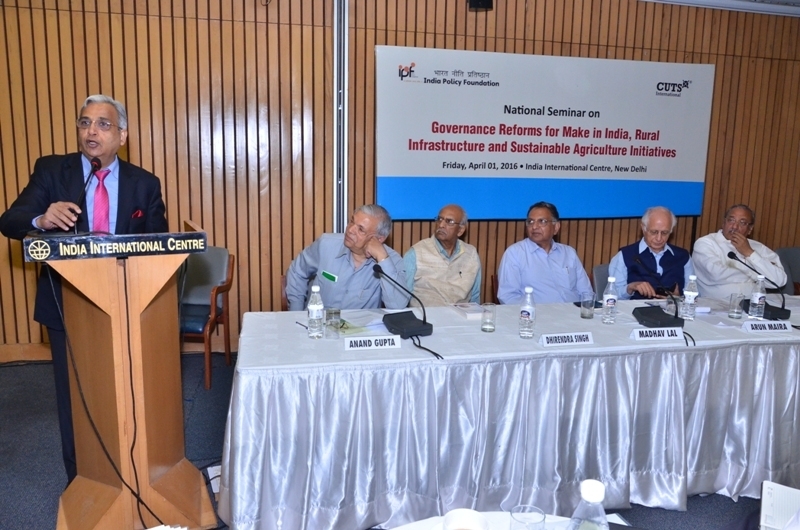
1st Session: Governance Reforms for Make in India Initiative
Chairing this sessionShri ArunMaira, Former Member, Planning Commissionsaid thatthe most important measure of the health of the system or an economy is whether people are able to live in a dignified fashion, in a sustainable fashion and have incomes with which they can buy all aspirational items as well as necessary things like food and shelter.
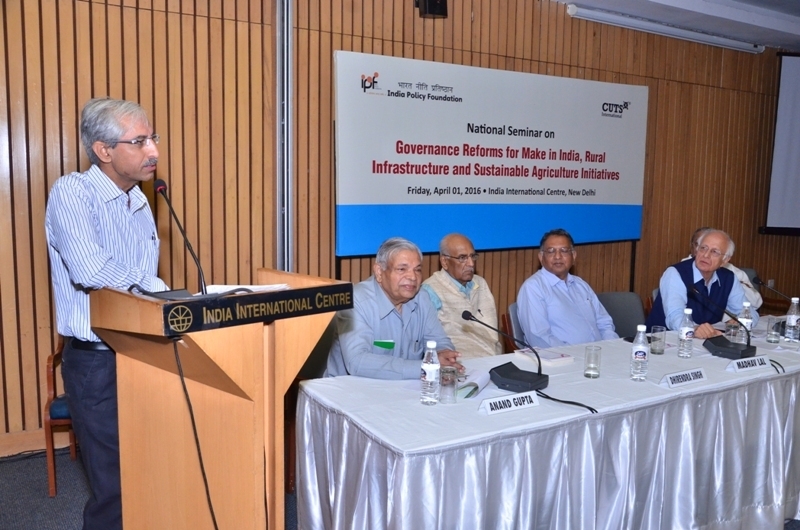
He further said that Clusters of small enterprises are a strategic necessity. Manufacturing of defense equipment in one’s own country is alsoa strategic necessity.
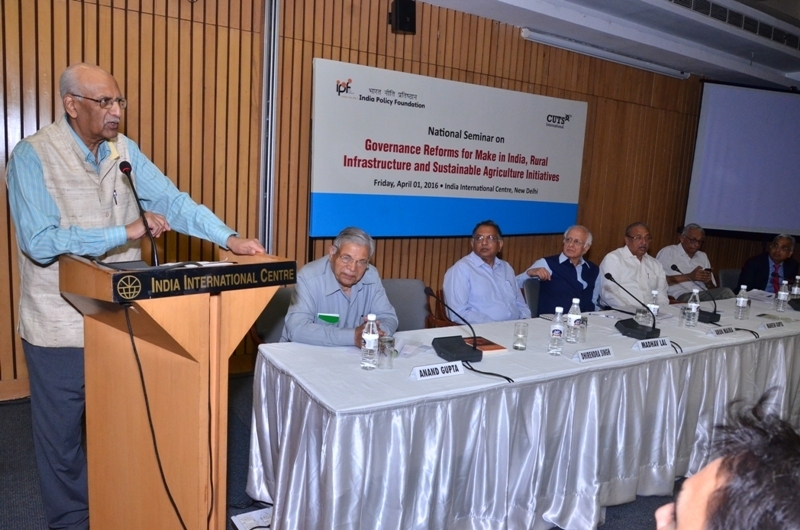
Shri N. C. Saxena, Former Member, Planning Commission said thathigh growth has been a jobless growth in our country. The other aspect is that in last 30 years one finds that the share of wage share in registered manufacturing has been going down and real wages have not increased in manufacturing. After 2012 there has been a massive decline in the rural wages. He said that inadequate business and growth in some sectors have contributed to the increased rates of rural wages namely; agriculture sector, construction sector resulting in large number of people becoming jobless.Also, MNGREGA (Mahatma Gandhi National Rural Guarantee Act) has largely been not very effective in the poorer states. Further, he pointed out that the structure of government jobs is skewed as there are too many people in the support positions and there are very few people in the line position. This kind of disparity needs to be corrected at least in the government. The difference between service provider’s interests are being looked after, service provision is not being looked after.He pointed out that the land use and purchase acts, the Essential Commodities Act and the Forest Act are grossly abused by the state governments. Land acquisition law passedby the UPA government is anti-farmer, anti-industry and pro-bureaucracy and pro-civil society. The government is very keen that people should be self-employed and should themselves create jobs. He observed that some of the self-employed like street vendors or rickshaw pullers are unaware and do not know how to deal with such laws which are imposed on them by municipalities. He also discussed the participation of women in theagricultural workforce and commented that it has decreased as most of their work is being done by machines. He suggested promoting pedal pumps in agriculture.
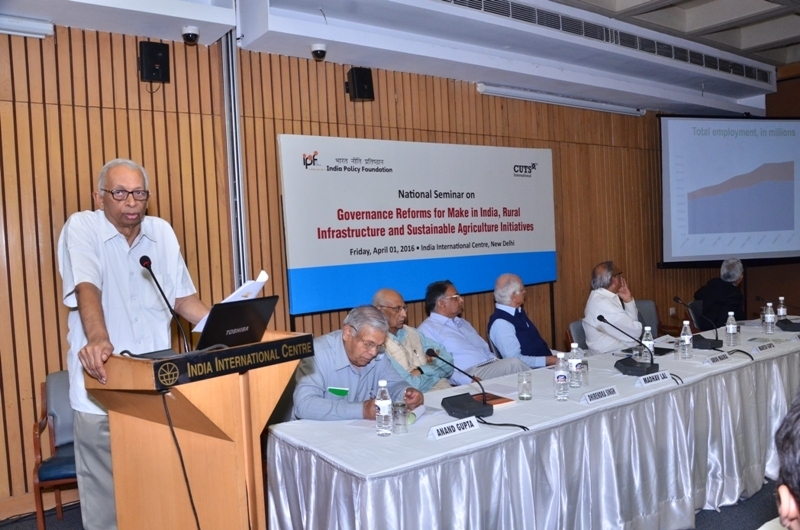
Shri Dhirendra Singh, Chairman, Committee on Facilitating ‘Make in India’ in the Defence Sectorpromulgated the defense procurement procedure for 2016 and also observed that the key chapter required to describe strategic partners and development partners is blank. He cautioned that defense business is a murky business and one needs to be alert. There is an immediate need of a national security doctrine.He said ‘Two elements that need attention as far as defense is concerned are that one must first be a producer and secondly one must have a product. What we are saying is that please identify what we call systems of systems integrators and these are integrators of what we call platforms’.He further said repetitive competition do not take place where one has longterm interests and therefore one must change competition to collaboration and the only way of changing competition is to have long term covenants. So, long term covenants are to be signed by the systems of integrators with the Ministry of Defense.Dhirendra Singh laidstress onindigenous research and development.
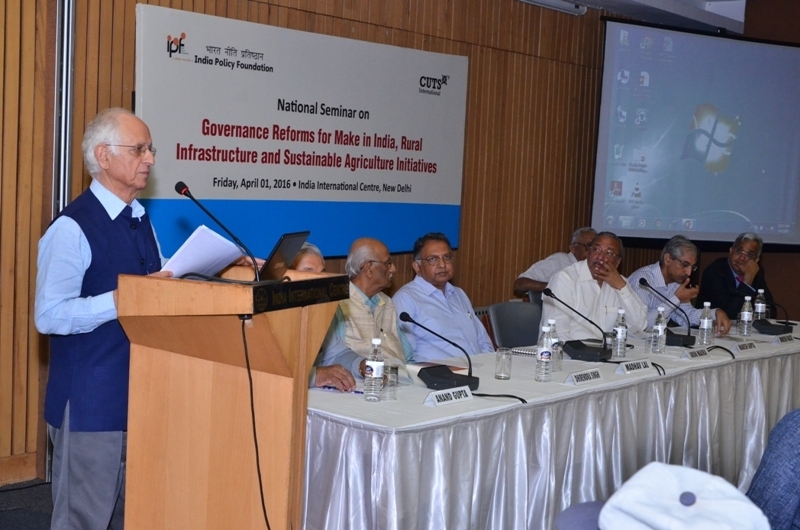
Shri MadhavLal,Former Secretary Micro, Small & Medium Enterprises (MSME)stressed that there has to be a roadmap and it has to be very clearly articulated. He said that therole the central government and the role of the state government are to be recognized for ease of business. He said that there is a need to look at the changed role of the individuals also.
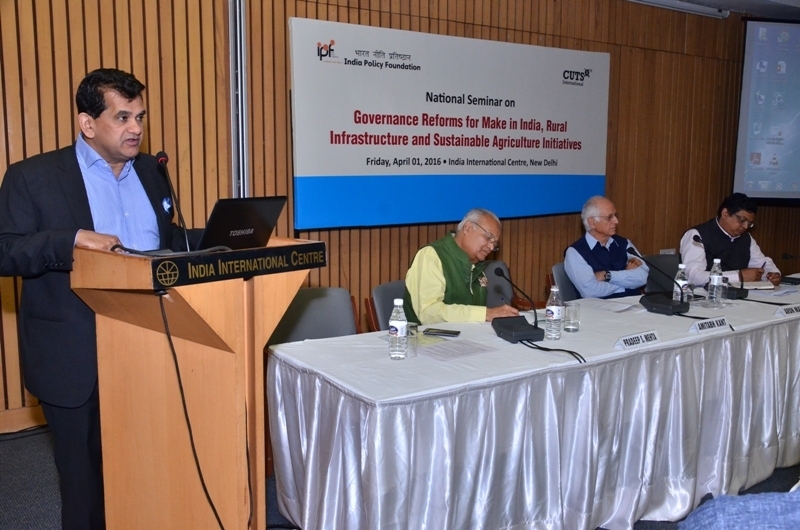
Shri Anand P Gupta, Director, Economic Management Institute, New Delhiemphasized on the need to have the culture of outcomes.Shri Mukesh Gulati, Executive Director, Foundation for MSME Clusters,brought in a practitioner’s perspective rather than a policy perspective. Asking the basic point of why we want to do ‘Make in India’, he emphasized that only two things are significant; people and the environment. He further elaborated on the threefold role of government as the provider of the services, enabler and regulator.
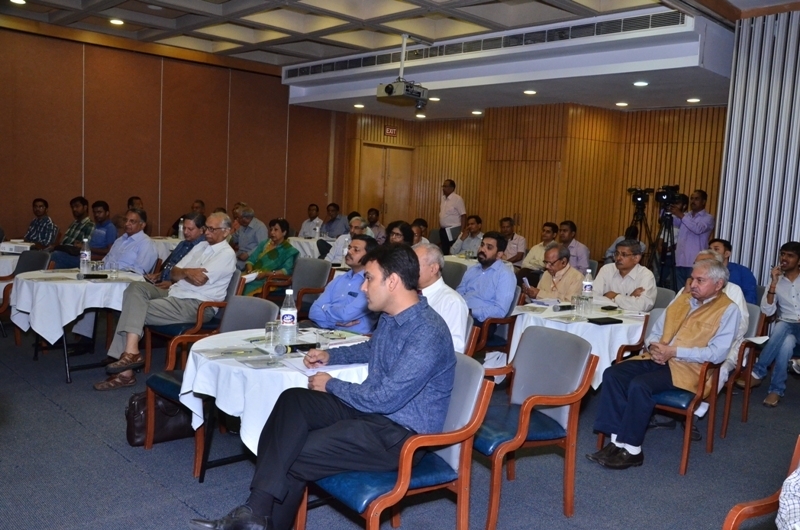
Shri Ved Jain,Vice President, ASSOCHAM, New Delhi questioned the role an industry association has in promoting the Make in India Initiative. He was of the view that the Darwin law of the ‘Survival of the Fittest’ applies everywhere. No industry can survive on relief and concession. He said that we need to assess the feasibility of Make in India, identify the areas where it can succeed and also check their competitiveness. He said that If we do not bridge gap between industry and the common man then the dream of Make in India will probably still remain a dream.
Shri Mahesh Gupta,MD, and CEO, Kent RO & President Ph.D. Chambers of Commercesaid that his expectations from this government was not ease of doing business, rather to not make business difficult. He felt that business will flourish of its own. The demand will drive the industry and people will make aprofit.
2nd Session: Rural Infrastructure and Sustainable Agriculture Initiatives
ChairingShri Gopal Agarwal, Trustee, India Policy Foundationemphasized on the need to move towards asolution and towardsSmart villages.Shri Badri Narayan Choudhary,General Secretary, BhartiyaKisanSanghdrew attention on themain issues of the farmers like generating income for produce, lack of respect for the farmers.Sanjeev Chopra,Additional Chief Secretary, Department of Agriculture, West Bengaladded a ray of light in the discussion by saying that if there are some success stories in India then agriculture is one of them. He suggested to liberalize the sector to transfer income to the farmer. He said commercial farming is a reality which we have to accept and with farm mechanization,KrishiBimaYojana,national markets, soil health card program, therelease of control of the traders from the mandis, we will be able to achieve greater heights. B Surendran,All India Organization Secretary, BhartiyaMazdoorSangh,said India needs to focus on four important areas. These are agriculture, manufacturing,services and decentralized economic with MSME sector.Shri PradipBaijal,Former Chairperson, Telecom Regulatory Authority of Indiasaidconnectivity can play a strong role in growth.Harsh Singh, Ex-Assistant Resident Representative, UNDP, India presented the concept of habitat development in which if an asset is provided then anyone can be associated with that asset and generate income.
Today, India’s credibility is stronger than ever. There is visible momentum, energy, and optimism. Make in India is opening investment doors. The world’s largest democracy is well on its way to become the world’s most powerful economy. Our hallmarks of exceptional service, outstanding ethical conduct, and resolute corporate responsibility must be entrenched within our ethos, and translated to our corporate culture, to ensure that we are recognized worldwide as delivering our vision and achieving our mission as is defined.